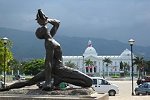By Dr Selwyn R. Cudjoe
July 16, 2019
 On Monday I presented a paper, “Writing the Slave Master of Trinidad,” at an important conference “Slavery and Its Afterlives: Blackness, Representation, Social Justice, Vision,” at the National Maritime Museum in London. The conference aimed “to extend our understanding of diaspora, to connect diaspora and, in the process, to forge new critical directions.”
On Monday I presented a paper, “Writing the Slave Master of Trinidad,” at an important conference “Slavery and Its Afterlives: Blackness, Representation, Social Justice, Vision,” at the National Maritime Museum in London. The conference aimed “to extend our understanding of diaspora, to connect diaspora and, in the process, to forge new critical directions.”
Continue reading The Making of a Scholar…

